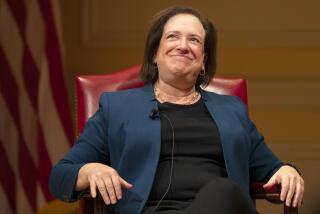$760-Million Award May Be Reduced, Experts Say
- Share via
Legal experts said Sunday the $760-million toxic pollution punitive damage award to 38 Lockheed workers rendered last week against five big oil and chemical companies may be pared substantially or even reversed in the appeals process.
“Experience shows that when punitive damages are extremely large, there is a likelihood of reduction,” said USC law professor Erwin Chemerinsky.
Los Angeles trial attorney Larry Feldman said that in this case, the remarks to the jury by Los Angeles Superior Court Judge Richard C. Hubbell, urging it to “send a notice out to the world,” probably will be subject to intense judicial review.
“I couldn’t believe he said it,” Feldman said. “That is rare. Judges can comment on the evidence if they want, but it’s rare they do.”
According to an unofficial transcript, Hubbell, just before the jurors’ deliberations began, told them: “Every chemical manufacturer in the United States that makes these chemicals is going to see this decision and say, ‘Boy, we better be very careful on how we distribute this product.’ ”
The judge also declared that “oppressive conduct” by the defendants--Exxon, Shell, Unocal, Ashland and DuPont--”harmed these plaintiffs” building Stealth fighters in Burbank.
In what was the largest toxic pollution verdict ever, the jury awarded the money to the past and present Lockheed workers found to have suffered harm from chemicals while building the bomber. The companies were blamed for not warning the workers about the toxic side effects of the chemicals.
*
Hubbell could either increase or diminish the punitive damage award under an expected motion for reconsideration from the defense, before the appeals are heard.
Laurie Levenson, associate dean of the Loyola Law School, predicted that “any verdict this high is going to draw pretty close scrutiny . . . . It’s an enormous judgment, but this may simply reflect how egregious the violations are or how worried the public is about them.”
A judge who commented on the case on condition of anonymity said he felt the greatest likelihood is that the amount will be reduced if the appeals process is followed all the way through.
The lead defense attorney for the five companies, Laurence F. Janssen, said Sunday that his clients are determined to appeal rather than settle the case.
According to the verdict, Exxon would be assessed $252.1 million, Shell $236.1 million, Ashland $145.6 million, Unocal $81.2 million and DuPont $45.6 million.
That is in addition to the $25.4 million in compensatory damages from the five companies the same jury had awarded the week before.
Janssen said the punitive damage award was all the more surprising since the jury assessing it didn’t hear any evidence directly about the conduct of the defendants but relied on the judge’s summary of evidence produced in earlier phases of the case.
The plaintiff’s attorney, Thomas V. Girardi, could not be reached Sunday. On Friday, he hailed the verdict in a brief statement issued by a publicist.
Chemerinsky cited the 1996 case in which the U.S. Supreme Court intervened to strike down a punitive damage verdict involving BMW.
An Alabama jury awarded a BMW purchaser $4,000 in compensatory damages and $4 million in punitive damages after ruling that BMW failed to reveal that it had repainted his new car.
Although the Alabama Supreme Court reduced the punitive verdict to $2 million, the U.S. Supreme Court still held that was “grossly excessive.”
More to Read
Inside the business of entertainment
The Wide Shot brings you news, analysis and insights on everything from streaming wars to production — and what it all means for the future.
You may occasionally receive promotional content from the Los Angeles Times.










